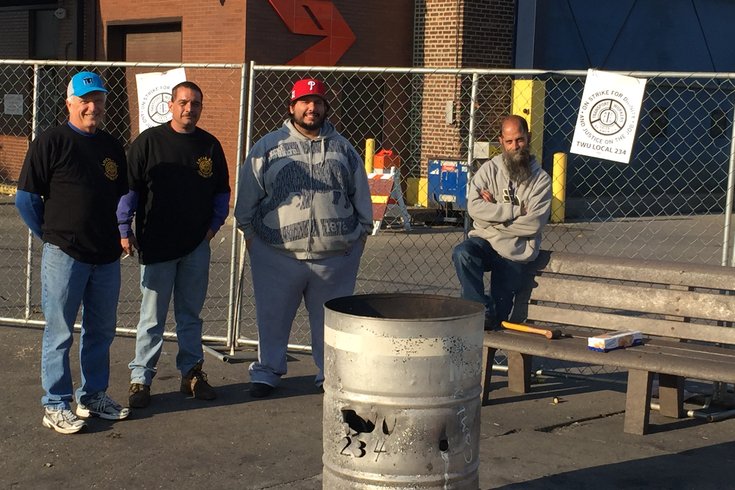
November 05, 2016
 Hayden Mitman/PhillyVoice
Hayden Mitman/PhillyVoice
Transit workers on strike at the Frankford Transportation Center, from left to right, Dave Laich, 44, of Langhorne; Mike, 48, of New Jersey; Jesse, 31, of Philadelphia; and Mike, 50, of Philadelphia.
UPDATE, 10:40 p.m. Saturday: The head of the Transit Workers Union said Saturday night that SEPTA is more focused on ending the five-day strike in the courtroom rather than at the bargaining table.
"SEPTA Board Chairman Pat Deon’s plan all along has been to rely on the courts rather than negotiations," said union president Willie Brown in a statement. "He is the one using the election as leverage. This is not the way to end a strike or get an agreement.
"Let’s stop stalling. We need to finish bargaining on the pension fund in particular," he continued. "We have nearly 5,000 workers in our union, SEPTA employs roughly 1,700 managers, yet they put more money into the management plan than frontline workers get.
"Pat Deon thinks he can get our labor for free," Brown's statement concluded. "Prior to the strike, their last offer would have had our members taking home less next year than they do today. That’s no longer the case. We’ve made progress on both economic and non-economic issues. Only a handful of issues separate us. It’s time to settle this deal at the table. Let’s get this done."
SEPTA, on its official Twitter account, said that negotiations were expected to resume Saturday night.
UPDATE, 7 p.m. Friday: Philadelphia Common Pleas Judge Linda Carpenter has denied SEPTA's request for an injunction Friday afternoon that would have ended a strike that has entered its fourth day, forcing more than 5,000 union employees to return to work.
Carpenter said she would "revisit" the issue if the strike continued into Monday – the day before the general election, according to Philly.com.
"SEPTA looks forward to the opportunity to resume testimony in court Monday morning," said spokesperson Kristin Geiger Friday evening.
Geiger declined further comment on the issue.
The transit agency announced Friday afternoon that it filed a lawsuit seeking to end the strike that has burdened commuters since Tuesday.
SEPTA asked the Court of Common Pleas to grant an injunction, arguing that the strike constitutes a "clear and present danger to the health, safety and welfare of our riders and the citizens of Philadelphia and the region."
Transport Workers Union Local 234 went on strike at 12:01 a.m. Tuesday, indefinitely halting the city's buses, subways and trolleys. Those transportation modes provide some 1.3 million trips each day.
"We're moving forward because this is critical," SEPTA spokeswoman Carla Showell-Lee said. "We have too many things at stake here."
The lawsuit claims the strike has caused people to miss critical medical appointments and is preventing some residents with disabilities from getting to facilities for specialty care. It also claims students are missing school and could prevent residents from voting on Tuesday.
SEPTA initially considered filing an injunction to force workers to work on Election Day, but Showell-Lee said the adverse effects of the strike extend beyond the election.
"It's bigger than that," Showell-Lee said. "There are too many things at stake, right now. We have to come to some type of agreement."
SEPTA and Local 234 have negotiated throughout the week, but a new contract agreement has not been reached. Those negotiations are ongoing despite the lawsuit, Showell-Lee said.
Local 234 President Willie Brown issued a statement decrying the lawsuit as a legal maneuver without any merit, saying the focus should remain on a bargaining session that began at 6 p.m. Friday.
“We will fight SEPTA’s request for an injunction tooth and nail," Brown said before Carpenter issued her ruling. "We would prefer, however, to concentrate our attention on productive bargaining to reach a fair settlement. At this point, only a handful of issues separate the parties."
SEPTA and Local 234 have worked to close the divide on a number of issues, including pensions, health care and some non-economic work rules.
"It appears that SEPTA’s plan all along was to avoid real bargaining while relying on legal tricks," Brown said. "Until recently, they demanded that our members bring home less money in the new contract than under our previous agreement. We are committed to bargaining a new agreement as soon as possible. That will happen at the bargaining table – not by rushing into court in a pointless attempt to restrict workers’ rights.”
Friday marked the fourth day of the strike. Throughout the week, both sides have exchanged barbs through the press. But SEPTA has endured longer transit strikes without seeking a court injunction.
When asked why such action was necessary now, Showell-Lee referred reporters to SEPTA's legal team. She said the decision to file a lawsuit was made by SEPTA board Chairman Pasquale T. Deon Sr.
This is the second injunction SEPTA has sought against Local 234 this week. On Tuesday, SEPTA obtained an injunction preventing Local 234 members from blocking Regional Rail crews from reporting to work, a tactic that forced SEPTA to cancel several trains during the afternoon commute.
The lawsuit claims the strike creates "adverse effects on the health, safety and welfare" of various city residents, including some 52,000 students who rely on SEPTA to get to school. SEPTA claims more than half of its riders making less than $50,000 — many less than $15,000 — and cannot afford to switch to taxis or ride-sharing services.
The lawsuit also claims that employees and volunteers of Associated Services for the Blind have been unable to work, depriving nearly all of the organizations of critical services.